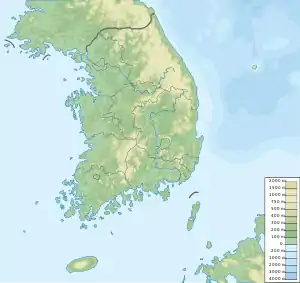Gugyedong Formation
The Gugyedong Formation (Korean: 구계동층; Hanja: 龜溪洞層; RR: Gugyedong-cheung), also known as the Guyedong Beds, is an Aptian to Albian geologic formation in South Korea.[1] Dinosaur remains diagnostic to the genus level are among the fossils that have been recovered from the formation.[2]
| Gugyedong Formation | |
|---|---|
| Stratigraphic range: Aptian-Albian ~ | |
| Type | Geological formation |
| Unit of | Hayang Group |
| Lithology | |
| Primary | Siltstone, conglomerate |
| Location | |
| Coordinates | 36.0°N 128.5°E |
| Approximate paleocoordinates | 43.9°N 126.4°E |
| Region | Gyeongsangbuk-do |
| Country | |
| Extent | Gyeongsang Basin |
 Gugyedong Formation (South Korea) | |
Fossil content
The following fossils have been reported from the formation:[1]
- Reptiles
- Ultrasaurus tabriensis[3]
- Dromaeosauridae indet. (="Koreanosaurus koreanensis")[4]
- Sauropoda indet.
- Testudines indet.[4]
- Flora
- Pseudofrenelopsis parceramosa[4]
See also
References
- Guyedong Formation in the Paleobiology Database
- Weishampel et al., 2004, pp.517-607
- Kim, 1983
- Kim et al., 2005
Bibliography
- Kim, H.M.; A.D. Gishlick, and T. Takanobu. 2005. The first non-avian maniraptoran skeletal remains from the Lower Cretaceous of Korea. Cretaceous Research 26. 299–306. .
- Weishampel, David B.; Peter Dodson, and Halszka Osmólska (eds.). 2004. The Dinosauria, 2nd edition, 1–880. Berkeley: University of California Press. Accessed 2019-02-21. ISBN 0-520-24209-2
- Kim, H.M. 1983. Cretaceous dinosaurs from Korea. Journal of the Geological Society of Korea 19. 115–126. .
This article is issued from Wikipedia. The text is licensed under Creative Commons - Attribution - Sharealike. Additional terms may apply for the media files.